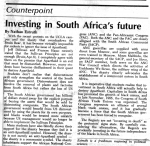There’s always a story if you follow the money.
The recent sale of the University of California’s investments in private prison companies and securities stirs an old debate on the effectivity of divestment as a social justice strategy.
Some have compared this to the UC Board of Regents’ deliberation on divestment from companies doing business in the apartheid state of South Africa three decades ago. In June of 1985, the regents voted against complete divestment, preferring to assess their investments individually by whether they were “good corporate citizens.”
Related: Ghoogasian: UC’s divestment from private prisons will increase awareness of issue
Student activists erupted in an organized campaign that would be unparalleled today. At UCLA, students organized a sleep-in at Murphy Hall, erected a tent city on Schoenberg Quad and built a shanty on Bruin Walk to represent the poverty of black people enduring apartheid. Vocal and sustained pressure led the Regents to vote in July of 1986 to completely divest from companies involved in South Africa by 1990.
Just months before their vote, however, the validity of student protests and the impact of divestment were still under scrutiny.
On April 14 specifically, first-year political science student Nathan Estruth wrote a submission to The Bruin explaining how divestment was not only futile, but potentially harmful, as capitalistic investment in South Africa would only promote good business practices that could permeate through and reconcile the deep racial divide.
Divestment, in contrast, he argued, would withdraw human rights interests and regulation, all while black Africans’ struggle would continue uninterrupted.
What Estruth failed to realize is that good business, just like divestment, cannot affect change alone. He brushed over other factors, such as many people’s belief that standard codes of corporate conduct inadequately promoted equality, and played on Cold War-era fears of communism, connecting protesters’ shanties, the South African Community Party, the Soviet Union and the rise of a Communist government in South Africa together.
Estruth’s beliefs were a product of the time and Ronald Reagan’s trickle-down economics, which he applied to apartheid as easily as he evoked Cold War fears that South Africa would side with the Soviet Union if the anti-communist apartheid government were to fall.
Like these beliefs, his prediction that the apartheid government would continue uninterrupted despite divestment was proven wrong. To be fair, studies show that, on a financial level, business itself continued as usual.
By no terms did disinvestment in the apartheid economy redefine the conversation, but it rather more widely publicized a campaign against apartheid with origins in its conception. Even then, it was most effective as a national effort, requiring support from Congress and big business alike.
Adding widespread awareness to the moral issue at hand, however, changed how many viewed apartheid – from a necessary evil, to an unnecessary reality.
It’s easy to see why today’s student activists still pursue divestment in hopes of a similar impact – to climate change, to the heatedly-debated Israel-Palestine conflict, to private prisons alike.
Like with South African divestment, students protested and advocated for divestment from private prisons, which utilize prison labor in a way some compare to slavery. The $25 million the UC disinvested, however, is considerably smaller than the $3.1 billion in investments it held in South Africa in 1986.
Money, though, is not all that’s changed.
The dissolution of the Soviet Union a mere five years after Estruth published his submission makes his fear seem irrational now, but the unpredictable shift from a Cold War-generated bipolar world to a multipolar world also upended the hard-and-fast moral imperative that made South African divestment’s bid for public awareness and higher standards of morality so impactful.
We no longer live in a world where there are more right answers, best countries or choice ideologies.
The American way is not simply a moral imperative. You’ve got to follow the money.
